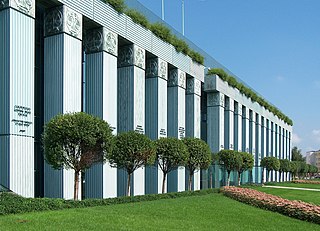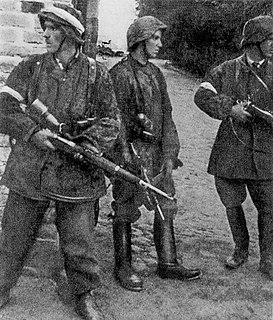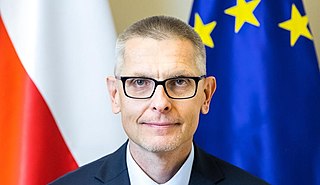
The Narodowy Bank Polski, often abbreviated to NBP, is the central bank of Poland, founded in 1945. It controls the issuing of Poland's currency, the Polish złoty. The Bank is headquartered in Warsaw, and has branches in 16 major Polish cities. The NBP represents Poland in the European System of Central Banks, an EU organization.

The Supreme Court is the highest court in the Republic of Poland. It is located in the Krasiński Square, Warsaw.

Jacek Maria Majchrowski is a Polish politician, lawyer, historian, and the current mayor of Kraków since 2002, making him the longest serving mayor in the history of the city. He is also a professor at the Jagiellonian University.

Stanisław Marian Kutrzeba (1876–1946) was a Polish historian and politician who was Professor of the Jagiellonian University from 1908, and then until the end of his life the Chair of Studies in Polish law. He was chair of the Law Department, university's rector (1932/33), General Secretary of Polish Academy of Learning (1926–39) and its president (1939–1946). He was one of many professors of Jagiellonian University arrested by Nazis during Sonderaktion Krakau in 1939. After being freed in 1940, he took part in the underground education. In 1945, he was deputy to the State National Council.

Franciszek Wawrzyniec Kamiński, pseudonym: „Olsza”, „Kowal”, „Zenon Trawiński” was a Polish politician and military leader, commander of the Peasant Battalions during World War II. After war he was a member of the State National Council and the Legislative Sejm. Imprisoned for political reasons during the Stalinist period.

Workers' Militia PPS-WRN often referred to simply as Militia PPS-WRN, was a Polish underground paramilitary formation of the Polish Socialist Party – Freedom, Equality, Independence active during the occupation of Poland by Nazi Germany and the Soviet Union in World War II between 1939 and 1945. The total number of clandestine members of MR PPS-WRN reached 30,000 at the time of the Soviet counter-offensive of 1944. They participated in both Operation Tempest against the Nazis and in the Warsaw Uprising of 1944. MR PPS-WRN was created in November 1939 amongst the prewar labour circles in Warsaw, Radom, Kraków, in Upper Silesia (Śląsk) and in the Dąbrowa Basin (Zagłębie) mainly for self-protection. It was supposed to help recreate the Polish prewar police and counter—intelligence services.

Andrzej Friszke is a Polish historian and lecturer. He specializes in the history of communist Poland and the democratic opposition to the communist regime.

Rzeczpospolita Polska was the official magazine of the Government Delegation for Poland. It was a source of instruction and information for other Polish underground organizations, including other underground publications, operating in occupied Poland.

Michał Weinzieher was a Polish art historian and art critic, museologist, and separately also a writer on constitutional law. He also published several pieces of travel reportage from France, England, and the Soviet Union.

Karol Tchorek was a Polish sculptor, art dealer and art collector. The designer of monuments, an activist in the ZPAP, and winner, among other awards, of the Polish Order of Polonia Restituta.
Leszek Zasztowt is a Polish historian and professor at the University of Warsaw.
Wojciech Jerzy Muszyński is a Polish historian and researcher. His points of interest are the latest history of Poland and military history.

Krzysztof Zbigniew Bojko is a Polish diplomat, ambassador to Jordan (2012–2016) and Mongolia.

Andrzej Papierz is a Polish journalist and diplomat. He is the former Ambassador of Poland to Bulgaria (2007–2010), the Undersecretary of State at the Ministry of Foreign Affairs (2018), and the Director General of the Foreign Service (2018–2021).

Włodzimierz Aleksander Marciniak is a Polish university teacher, political scientist and historian of Russia, an ambasador to Russia (2016–2020).

Rafał Poborski is a Polish diplomat who serves as an ambassador of Poland to Azerbaijan since January 2020.

Adam Szymon Pragier was a Polish economist, Doctor of Jurisprudence professor at the Free Polish University, socialist activist, politician, member of the Polish Legions and writer. A minister of information and documentation in the Polish government-in-exile in London, he upheld for the rest of his life its legal continuity in the struggle for the restoration of Poland as a sovereign state.

Łukasz Jan Szumowski is a Polish cardiologist who served as Minister of Health from 2018 to 2020. He is also a member of the IX Sejm, representing the Płock constituency, elected from the lists of Law and Justice.

Marcin Kubiak is a Polish diplomat, ambassador to Zimbabwe (2007–2008), South Africa (2009–2012), Malaysia (2015–2017), Iraq.

Krzysztof Karwowski is a Polish journalist, since 2020 serving as an ambassador to Morocco.


















